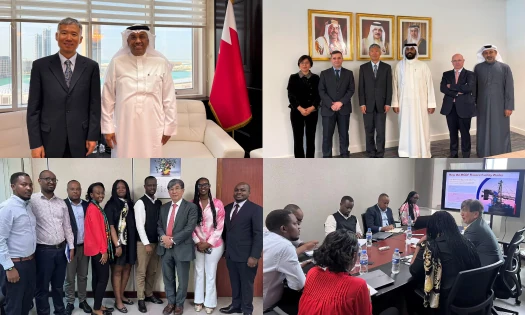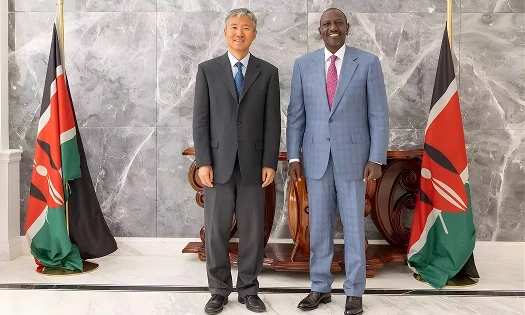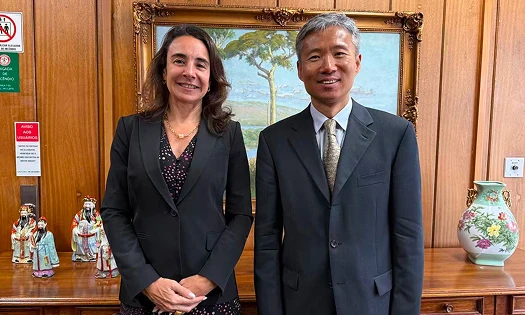The Multilateral Cooperation Center for Development Finance (MCDF) and its partners provided a major boost to efforts linking connectivity infrastructure and climate action during the 27th UN Climate Change Conference (COP27). As a part of the COP27 Presidency’s official event of Finance Day on 9 November, MCDF and Egypt’s Ministry of Finance jointly organized a high-level seminar participated by government Ministers and leaders of Multilateral Development Banks (MDBs) to discuss the financing of climate-smart connectivity infrastructure. The panelists were in agreement that MCDF is a unique and effective platform to enhance financing in connectivity infrastructure in a sustainable manner through innovative thinking and partnerships.


In opening the event, Egypt’s Minister of Finance, Dr. Mohamed Maait, emphasized the importance of connectivity infrastructure as it facilitates growth and enhances multilateral cooperation. He then noted that “it is crucial that such infrastructure is designed and implemented in a climate-resilient manner. This involves integrating adaptation and mitigation and a loss and damage strategy to deal with climate risks.”


Echoing Dr. Maait’s remarks, China’s Special Envoy for Climate Change, Mr. Xie Zhenhua, discussed the challenges in implementing the Paris Agreement on Climate Change and introduced China’s efforts in addressing the issues while promoting global connectivity. He said: “Connectivity infrastructure development also helps countries address climate change and advances carbon neutrality or net-zero carbon dioxide emissions. But developing countries alone cannot afford to adequately finance low-carbon resilient connectivity infrastructure. Developed economies, the private sector, banks, and others need to play a role in providing financial and technical support for climate-smart infrastructure development.”
The President of the Islamic Development Bank (IsDB), Dr. Muhammad Al Jasser, also observed that: “Regional connectivity is a cornerstone of regional economic cooperation and integration. Yet historically, the crucial nexus between regional connectivity infrastructure and climate finance has not received the level of attention and investment it deserves.” He then expressed his keen interest in IsDB’s active partnership with MCDF since joining as a member in 2021 and introduced IsDB’s collaboration with MCDF in identifying sustainable connectivity infrastructure investment opportunities in Central Asia, together with the Asian Infrastructure Investment Bank (AIIB).
On behalf of V20 (Vulnerable Twenty Group), Liberian Minister of Public Works, Ms. Ruth Coker-Collins, introduced the challenges and the need for innovative solutions to finance climate-resilient connectivity infrastructure in climate-vulnerable countries. She noted: “Liberia needs innovative financing to support the development of climate-smart connectivity infrastructure. Increases in rainfall intensity throughout the country are making maintenance challenging. We need to break the cycle of build and repair as public budgets do not provide a buffer to absorb climate shocks.”
The President of AIIB, Mr. Jin Liqun, discussed the importance of new ideas and new approaches. Only with ‘out of the box thinking’ is it possible to ensure that infrastructure projects do not damage the environment, reduce emissions, and help these countries accelerate their progress towards net zero, all at the same time. He then referred to the importance of MCDF in this specific context to promote innovation. “MCDF is a smart scheme because it has some very special features,” he said. “We are very happy to work with IsDB, or with other institutions, because we make sure the resources of MCDF will be used most effectively.”
Having worked very closely with MCDF for the last six months in 2022 through the workshop series on climate-smart connectivity infrastructure in conjunction with Egypt’s hosting of COP27, Egypt’s Vice Finance Minister, Mr. Ahmed Kouchouk, remarked that: “MCDF is a great platform to share experiences where we can learn from each other at the local, regional and global levels. As a founding member and a true believer of MCDF, we believe we can do a lot using MCDF as a platform.”
World Bank Managing Director of Operations, Mr. Axel van Trotsenburg, then discussed the context in which MCDF can make substantial contributions by noting that “this is a necessary discussion, particularly for Africa.” Highlighting that only 40 percent of the African population has access to electricity, he believes there is a huge need to invest in climate-smart connectivity infrastructure in Africa. He also believes there is a huge potential for economies of scale through cross-country and regional integration. “While IDA was able to mobilize a substantial amount of money, it is still far from being enough,” he said, referring to the World Bank’s International Development Association. He stressed the need for close collaboration among MDBs, governments and the private sector.
In concluding the seminar, the Chief Executive Office of MCDF, Mr. Zhongjing Wang, emphasized that there is a need for new finance to fill the investment gap for connectivity infrastructure in developing countries and, at the same time, to put in place the right policies, standards, and frameworks of environmental and social safeguards to ensure investments are made in the right way. MCDF intends to grow with its partners. “With your support and partnership, we can create a better-connected, and climate-smart future,” said Mr. Wang.
This seminar concluded a series of four workshops held during the year exploring climate-smart connectivity infrastructure - including land transport, shipping, and cross-border electricity infrastructure towards achieving net zero emission targets. They were organized by MCDF in partnership with the Egyptian Ministry of Finance, AIIB, IsDB, V20, World Bank and the World Resources Institute. This concluding high-level seminar attracted nearly 90 people in-person at COP27 in Sharm el-Sheikh and almost 500 online viewers.
ABOUT MCDF:
MCDF is a multilateral initiative to foster high-quality infrastructure and connectivity investments in developing countries, through wider application of the standards of accredited International Financial Institutions (IFIs). It supports information-sharing, capacity building, and project preparation for both developing country governments and new partners.
Click here to find out more about MCDF and check out our new video on climate-smart connectivity infrastructure.







